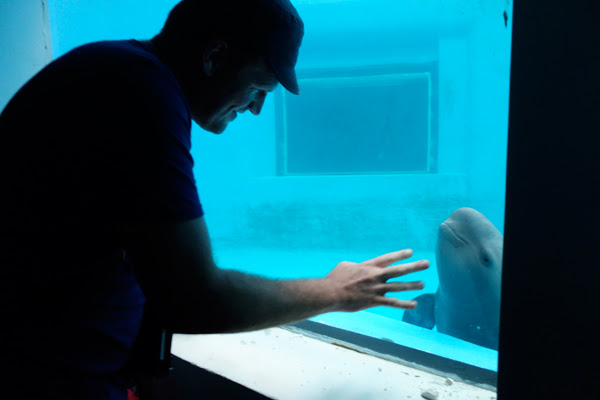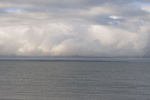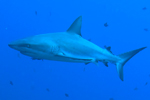A Pocket Guide to Sharks of the World
By Gabriel Thoumi Why should we be interested in learning about sharks and concerned about the role they play in our Earth’s oceans? Sharks form a critical cornerstone supporting regulation of our Earth’s oceans. Sharks In A Pocket Guide to Sharks of the World by David A. Ebert, Sarah Fowler & Marc Dando, we learn about the 501 shark species currently identified, including the 77 shark species newly identified since 2005, that...
Reporter’s Journal: A story sans words
Special Reporting Initiatives photographer Dominic Bracco II tries to capture the aquaculture scene at Liangzi Lake. A local fishfarmer attempts to capture his own view. Dominic’s photos will appear with Erik Vance’s reporting on the demand for sustainable fisheries products in China.
Reporter’s Journal: It isn’t a beluga
Special Reporting Initiatives Fellow Erik Vance gets up close and personal with a finless porpoise housed at Institute of Hydrobiology in Wuhan, China. Vance and his colleague, photographer Dominic Bracco II, are reporting on the market for sustainable fisheries in China. Photo credit: Shouqi...
Reporter’s Journal: Bomb Harvest
Porters sort and tally a week’s worth of landings from a bomb fishing crew before carrying the catch to the docks in Makassar, Indonesia. Each plastic basket is worth Rp. 100,000 ($8). The full tally for this boat was Rp. 18,800,000 or $1404. The porters get paid a percentage for shuttling the catch to shore and selling the fish to wholesale distributors in the city. This photo was taken by Mongabay.org’s Special Reporting...
Reporter’s Journal: A Wood & Glass View
Wood and glass goggles used by traditional divers throughout Sulawesi. Though produced near-exclusively by the Bajau sea gypsies, “traditional” goggles are commonly used, regardless of ethnic group, when spear-fishing, cyanide fishing or collecting sea cucumbers, groupers or fish killed with bombs that are detonated underwater. However rubber recreational dive masks are becoming more prevalent. This photo was taken by Mongabay.org’s...
Reporter’s Journal: In Search of Sardines
Community members crowd aboard a slerek purse-seiner in Muncar, East Java, the morning after a successful sardine fishing expedition. University of British Columbia researchers calculated that nearly half the landings in Muncar are distributed to the crew, their relatives, and their neighbors, to eat at home or sell. Though an insurance for protein-rich diets among the local community, the practice means that commercial sardine sales...
Reporter’s Journal: Infant Shrimp
A technician checks on week-old shrimp larvae or nauplius, at the world’s largest shrimp and mollusk broodstock center in Bugbug, Indonesia. The center hopes to become a major supplier inexpensive and healthy “parent” shrimp to Indonesia’s domestic shrimp farming industry, to reduce reliance on pricier and occasionally disease-ridden imports from abroad. Indonesia is one of a handful of shrimp-producing countries unaffected by...
Reporter’s Journal: Fishermans’ Wives
Fishermens’ wives negotiate a price for freshly caught sardines in Negara, a town on the shores of the Bali Strait. The strait is about to become Indonesia’s first region to be managed under an ecosystem-based approach to fisheries management. This photo was taken by Mongabay.org’s Special Reporting Initiatives fellow Melati Kaye, who is reporting on the state of the fishing industry in...
Reporter’s Journal: from the fish warehouse
A worker packs Leopard Coral Grouper in a warehouse in Makassar, Indonesia. Indonesia is one of the world’s largest suppliers of live reef fish, mostly to East Asian markets. Though selling live reef fish is legal in Indonesia, many of the fish are caught illegally using cyanide. This photo was taken by Mongabay.org’s Special Reporting Initiatives fellow Melati Kaye, who is reporting on the state of the fishing industry in...
Reporter’s Journal: Telling Fiji Time
The expression “Fiji Time” is commonly used among locals and expatriates. From my island experiences, it feels as though I could insert the name of any small island before the word, “time.” But Fiji time seems to also refer to time spent on the obligatory rituals that allows one to enter a village, be accepted, and talk more intimately with the people who belong to it. Aside from navigating the proper customary channels for permission...
Reporter’s Journal: Fighting poachers and Mother Nature
Fijians communities are largely in charge of managing their waterfront. Volunteer fish wardens in the village, appointed by the chief or the Minister, are the only official members of a village who can legally stop poachers. Though they rarely have any equipment to enforce protection of their tabus (swaths of temporarily protected marine areas inside their fishing grounds), they are harder pressed to fight the effects of climate...
Happy world oceans day! (photos)
Coastline in Colombia. Photo by: Rhett A. Butler. Celebrated since 1992, today is World Oceans Day! As apart of the day’s festivities, conservation organization Oceana is asking people to become Ocean Heroes by pledging to recycle, clean up a local waterway, or eat only sustainable seafood for the summer! Purple-striped jellyfish at the Monterey Bay Aquarium. Photo by: Rhett A. Butler. Leopard shark in a kelp forest at Monterey...
Making shrimp farming sustainable (video)
An in-depth look at one figure in the shrimp farming industry, Linda Thorton, who is helping with efforts to create standards for environmentally sustainable shrimp production. Shrimp farming has been a target of environmentalists for links to mangrove destruction and pollution, among other...
Carl Safina on the gulf spill (video)
Last month on the one year anniversary of the oil spill in the Gulf of Mexico (dubbed the US’s worst environmental disaster), author Carl Safina spoke about the impacts of the spill and the even bigger disaster that the media has overlooked. Safina has recently come out with a book called: A Sea in Flames: The Deepwater Horizon Oil Blowout. For a recent interview with Carl Safina: The ocean crisis: hope in troubled waters, an...
Economic worth of living sharks (video)
It turns out that sharks are worth more alive than dead. According to a new study, a single shark is worth $1.9 million over its lifetime as a tourist attraction in the island nation of Palau. Sold for consumption the shark is worth around $108. In this case a shark is worth a stunning 17,000 times more alive than dead. Sharks worldwide are being decimated, largely for the Asian delicacy shark fin soup. Some populations have fallen by...
Conservation on the ground: how traditional fishermen saved sharks in Madagascar
Malagasy family helping fisherman take his boat out to sea . Photo by Rhett A. Butler. Or, Guitarfish a Go-Go- Bribes and barrages in Belo-sur-Mer By: Brian Jones, Blue Ventures Conservation in Belo-sur-Mer, Menabe, Madagascar. YOU’VE got to admire the mettle of people who, despite the cards being seemingly insurmountably stacked against them, can still stick to their guns and stand up for what they believe in. I didn’t give...
Power Shift activist: ‘there’s still [BP] oil on our coast’ (video)
An activist with Power Shift 2011 says BP not living up to its obligations one year after disaster. Activist from New Orleans wants everyone to know: ‘there’s still oil on our coasts’.
Coral reefs in 55 years (video)
It’s 2065, and something has happened to the world’s coral reefs… A video produced by Earth-Touch in association with the Zoological Society of London (ZSL), EDGE, and Global International.
Activism: nominate an Ocean Hero!
Green anemone at the Monterey Bay Aquarium. Photo by: Rhett A. Butler. Ocean conservation organization, Oceana, is asking for nominations for its 3rd Annual Ocean Heroes Contest. According to their blog: “Think of the person you know doing the most for the oceans — and maybe it’s yourself! […] Past nominees have included educators, scientists, fundraisers, activists, and that’s just a start. And like last year, we...
“I hope that I never have to see it again”: oil spill hits penguins on Nightingale Island (video)
Video documents the oil spill on Nightingale Island in the remote Southern Atlantic ocean, which has taken a particular toll on Endangered northern rockhopper penguins Over a week ago conservation workers have hundreds of oiled northern rockhopper penguins (Eudyptes moseleyi) after a cargo vessel wrecked on Nightingale Island, a part of the remote UK’s Tristan da Cunha archipelago. According to a press release by BirdLife...














